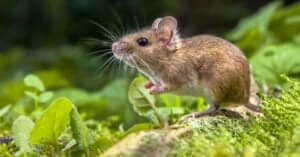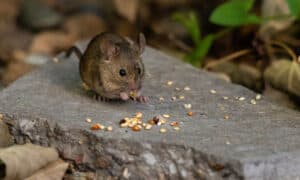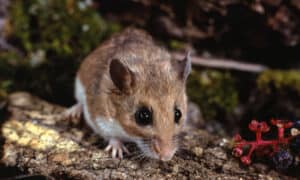Mice are very common pests throughout the world. They love to live near human settlements so they can get their paws on some tasty food. Unfortunately, mice can cause some serious damage to homes and the health of people living in them along the way. Many methods of keeping mice at bay have been concocted and suggested over the years. One popular barrier method relies on using mothballs. Do mothballs keep mice away, though?
Let’s take a closer look at the subject and see if mothballs are worth using or if another method could keep mice away from your home.
Why Is It Important to Keep Mice Away?
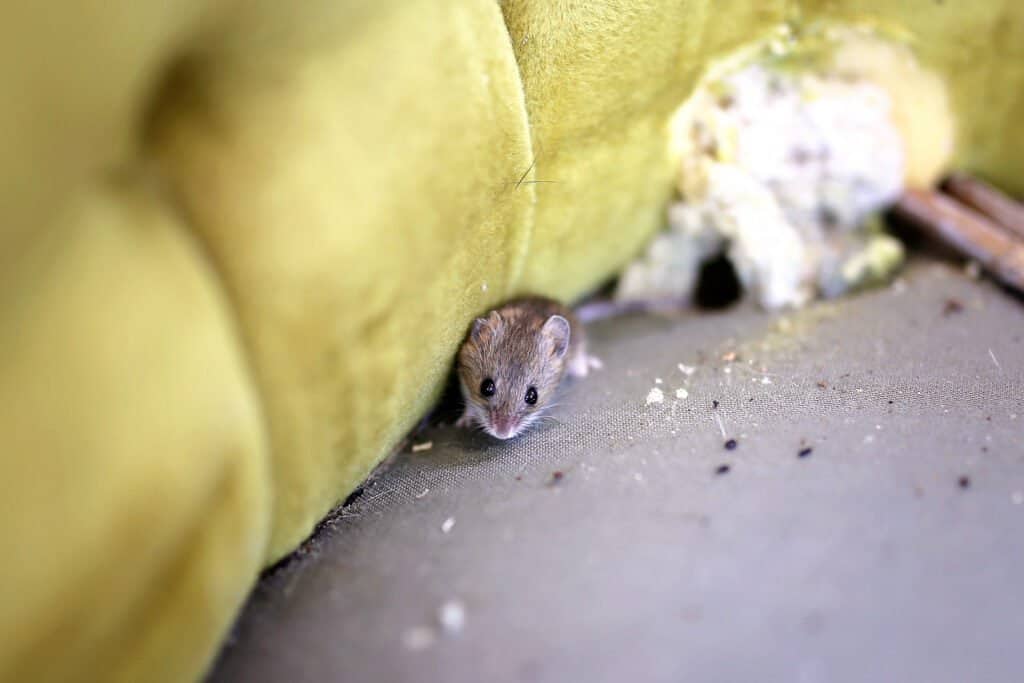
Mice are destructive and disease vectors.
©ChristinLola/Shutterstock.com
First off, we need to understand why it’s so important to keep mice away from your home. Several reasons exist that you’ll want to ensure mice are away from your home.
- Mice are destructive. An infestation of mice is troublesome because mice will ruin cloth materials, paper goods, and other things in your home to make a nest. Moreover, mice chew on the structure of a home to make bigger entry holes and even chew electrical wires.
- Mice can spread diseases. While they may look cute, mice are vectors for deadly diseases. That includes the deadly hantavirus and hemorrhagic fever. They spread these diseases by biting humans or when humans touch mice droppings or urine.
- Mice will destroy or eat your food. Compared to the other two issues raised here, this may seem minor. However, you have to throw out any food that mice have touched. Also, if they know you have food, more mice will come to your home.
- Mice breed very fast. A mouse only needs to be 6 weeks old to breed, and they only need 3 weeks to give birth to a litter. The last thing you need is an infestation with a bunch of mice having 30 to 70 babies per year.
Now that you have good reasons to keep mice away, let’s take a look at what keeps them from coming back.
Do Mothballs Keep Mice Away?
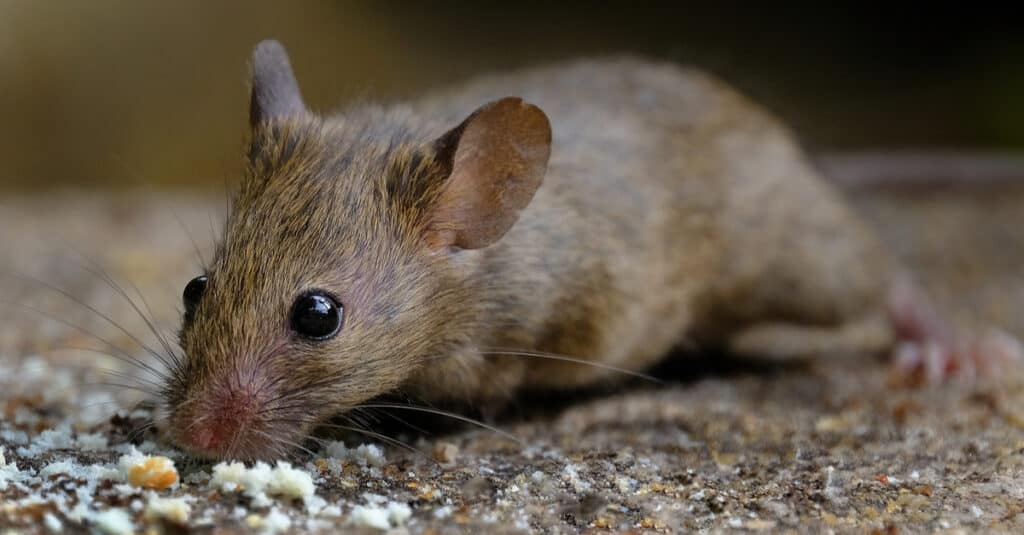
Many ways exist to keep mice away, but mothballs are not one of them.
©Paulpixs/Shutterstock.com
No, mothballs do not keep mice away. To understand why this is the case, we need to look at what mothballs supposedly do to keep mice away from your home. For one thing, mothballs are not a safe type of pest control to start with. If you place hundreds of them around your home, you’re going to end up doing some damage to the environment.
Ethics are not the only problem with using mothballs. The entire reason that mothballs are supposed to keep mice from your home is that they have a substance in them called naphthalene. This chemical is what gives mothballs their incredibly strong smell. Strong smells may deter mice, but it would take a lot of this chemical to keep mice away.
The smell isn’t going to irritate them enough to keep mice out of your home. Using moth balls inside your home could actually damage your health and that of your pets and children. As we’ve already said, using them outside is harmful to the environment. Unless you stuff mothballs in every crevice in your home and around the perimeter, mice will simply find a way around them.
Not only do mothballs not keep mice away, but they are also bad for your health and the environment.
What Actually Keeps Mice Away?
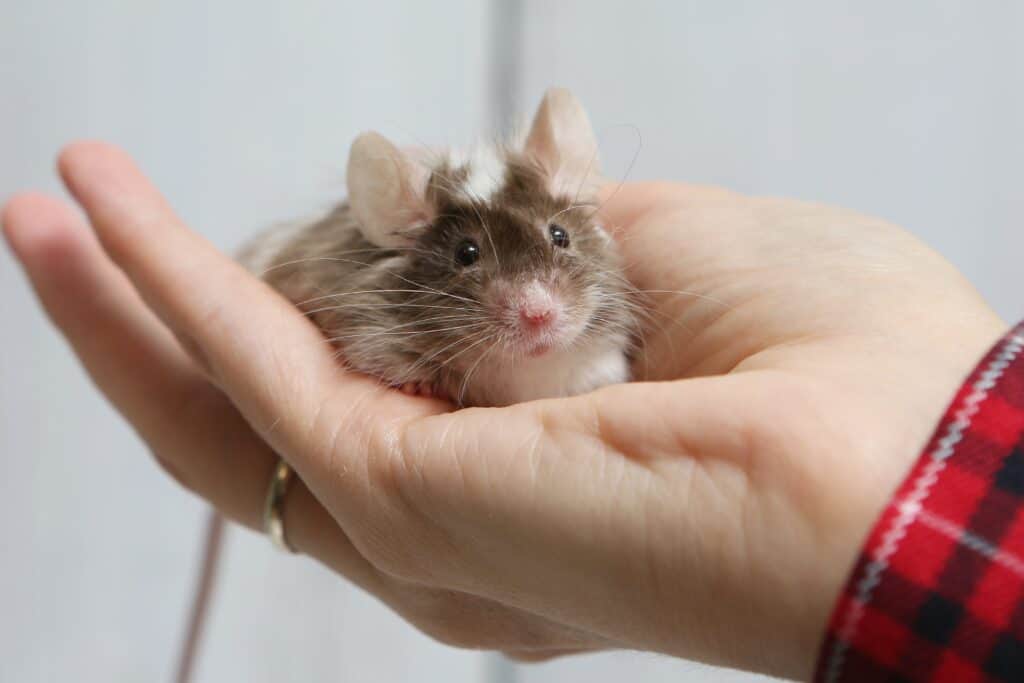
Although mothballs won’t work, you can keep mice away.
©Sergey Bezgodov/Shutterstock.com
Now that we’ve answered, “if mothballs keep mice away” and shown you why they don’t work, we have to consider some items that do keep mice away. Let’s take a look at better barrier methods for your home that will work.
Peppermint Oil
Peppermint oil is a popular tool people use to keep mice at bay. The peppermint smell from this oil is so intense that it makes the mice avoid it. You can find this product in premade spray bottles, or you can make your own concoction.
You can apply this peppermint oil around places in your home where you think mice are going to get inside. However, you don’t want to use too much, or the smell will be overwhelming for you. Furthermore, while peppermint oil works, the fact is that their plants will not work.
Cayenne Pepper
Strong peppers are enough to make most humans turn away from a food source, and the same concept applies to mice. Cayenne pepper is not something you want to sprinkle all over your home, though. You can find recipes to make mixtures to spray around your home. They often include pepper, water, and dish soap.
Spray this combination around areas where you think mice are entering your home. However, it should be noted that people have reported various levels of effectiveness with this.
Traps
The last line of defense against mice is mice traps. Generally speaking, there are two kinds to use: fatal and non-fatal. The non-fatal, or humane traps, are designed to keep the mouse inside so you can release it away from your home.
The fatal traps are the ones that spring and crash down on their prey, instantly killing them. Then, it is up to you to find them and clean up the mess. Both of these types of traps have their merits, but you have to decide which one suits your style.
Of course, another sort of trap is poison bait traps. These packets of poison bait draw hungry mice to them. The mouse eats the bait and then dies, preventing it from infesting or breeding in your home. These are all effective ways to reduce the likelihood that mice are going to make their way into your home.
So, do mothballs keep mice away? No, they do not. However, you have many different options for keeping mice away. Some of them are more final than others, though. The bottom line is that you do not want a mice infestation in your home. Using any of the methods outlined here reduces their population. However, mothballs are not going to help your cause.
The photo featured at the top of this post is © Landshark1/Shutterstock.com
Thank you for reading! Have some feedback for us? Contact the AZ Animals editorial team.




